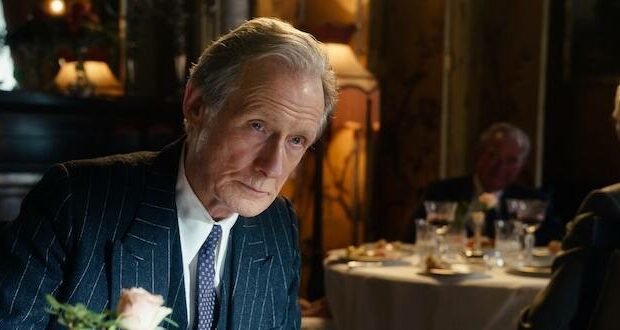Living is aptly titled.
It’s a deceptively simple, even nondescript name, to be sure—easily forgotten and, perhaps, easily overlooked.
But as the movie tells us, so is living itself. We all, by the nature of reading this review, are alive. But how many of us know how to live?
To live a life, and live it well … how does one do such a thing?
The film, which received two Academy Award nominations, is an adaptation of Akira Kurosawa‘s drama, Ikiru, and derived from Leo Tolstoy’s 1902 novel The Death of Ivan Ilyich.
Mr. Williams—always Mr. Williams—has lived his life (the last few decades of it, at any rate) with absolute respectability. It’s what is expected of him. Indeed, it’s what he expects of himself.
He is, after all, a man of some import. As the manager of the Public Works Department in London’s County Hall, he wears a black suit and bowler hat, as is expected. He’s never late and works a full day, as expected. People come asking for the Public Works department to do—well, works for the public, as expected.
And as expected, Mr. Williams rarely says yes. He rarely says no, either. He is, after all, an integral part of a bureaucracy. Papers are shuffled upstairs or down, sent across the hall or across the road. And often, they simply sit in the stacks of papers at Public Works for a few weeks, until the matter either disappears or a new request is filed.
“There’s no harm,” Mr. Williams will say.
That gentle statement about grinding government delay, too, is expected of him. He has done little else for lo these many years.
But then something unexpected happens to Mr. Williams. Death is soon knocking on his door from incurable cancer. He can file it away six months, perhaps nine at the most. But then, death will come through his door and take him away, not even bothering with the requisite triplicate forms. Nothing can stop his shadowed scythe. Not even British bureaucracy.
When Mr. Williams doesn’t go to work the day after he finds out, it’s as if Big Ben itself skipped a toll. He instead goes to a seaside town and confesses his predicament to a free-spirited playwright he meets in a café. Mr. Williams tells the man (Mr. Sutherland) that he came to town hoping to shed his rigid, aged “Britishness” and, for once, live a little.
But now that he’s there, with a willing spirit and spending money to spare, Mr. Williams realizes something rather sad.
“I don’t know how,” he confesses.
To live a life well? To do that, given the unforgivable timetable Mr. Williams has been given, is all-but-impossible. But to live well? Perhaps there’s still time for that.
Mr. Sutherland, the playwright whom Mr. Williams meets, is certainly eager to show Mr. Williams the pleasures that perhaps he so long ignored. But Mr. Williams isn’t really interested in wiling away the days he has left on tawdry pastimes. He’s after something more elusive, something with more meaning.
He sees a glint of that in Miss Harris, a young lady who worked for him briefly at Public Works. She’s young and spirited, and Mr. Williams begins to spend what time he can with her—hoping, he confesses later, that she might somehow teach him to live more fully. But that, too, while helpful, is a dead end.
No, he ultimately finds meaning by going back to work, of all things. But instead of shuffling papers to other departments or letting them sit in his baskets, he takes on particular request on. He uses whatever means he has at his disposal to shepherd the project through County Hall’s byzantine system and work-averse managers, showing a stunning understanding of what method of persuasion might work for each. He even begs essentially the manager of the entire bureaucracy—a titled noble to whom Mr. Williams has long literally bowed in deference—to consider his petition.
In so doing, Mr. Williams does something practically unprecedented: He gets something done. And by the time he’s done, he’s inspired others to do the same.
A lot of us—even many of us Christians—don’t quite know what to do with our days on earth until they’re almost gone. And then we remember all the places we wanted to see and the things we hoped to do. We regret the time we spent killing it and wish we had more time to do the things we really valued. We think about how to repair relationships or somehow, in some way, get a little closer to the person that God wanted us to be this whole time.
But what sort of person does God want us to be?
For Mr. Williams, the answer is one we’d do well to at least think about (even if Mr. Williams would likely not bring God into the conversation at all): It’s a person who does his best. Who makes a difference. A person who doesn’t just check boxes and shuffle papers, but works to make life a little better for those around him.
I love the fact that Mr. Williams didn’t punt his life for a few months of fun or frivolity. He didn’t spend it trying to recapture the joy of youth. He didn’t, ultimately, leave who he was and who he’d been all these years. He just became a better version of that person—making a difference as just a regular ol’ bureaucrat.
And it, also like its predecessors, plays it pretty straight and pretty clean. The content is surprisingly mild for a PG-13 film: We see the interior of a rather naughty tent, and we hear one British-centric profanity. Smoking is fairly pervasive. But that’s it. It’s almost clean enough to be cleared for broadcast on the 1953 version of the BBC.
Of course, this film isn’t for kids. But for adults who like to chew on bigger themes without gagging on content problems, and for those who like to see some very fine performances (lead Bill Nighy is rightly getting some Oscar attention), Living fills out the form for “good movie” and files it in triplicate.
Living is still in selected theaters, including the Glenwood Arts in Overland Park. It can also be streamed.
–Bill Asay | PluggedIn
 Metro Voice News Celebrating Faith, Family & Community
Metro Voice News Celebrating Faith, Family & Community










